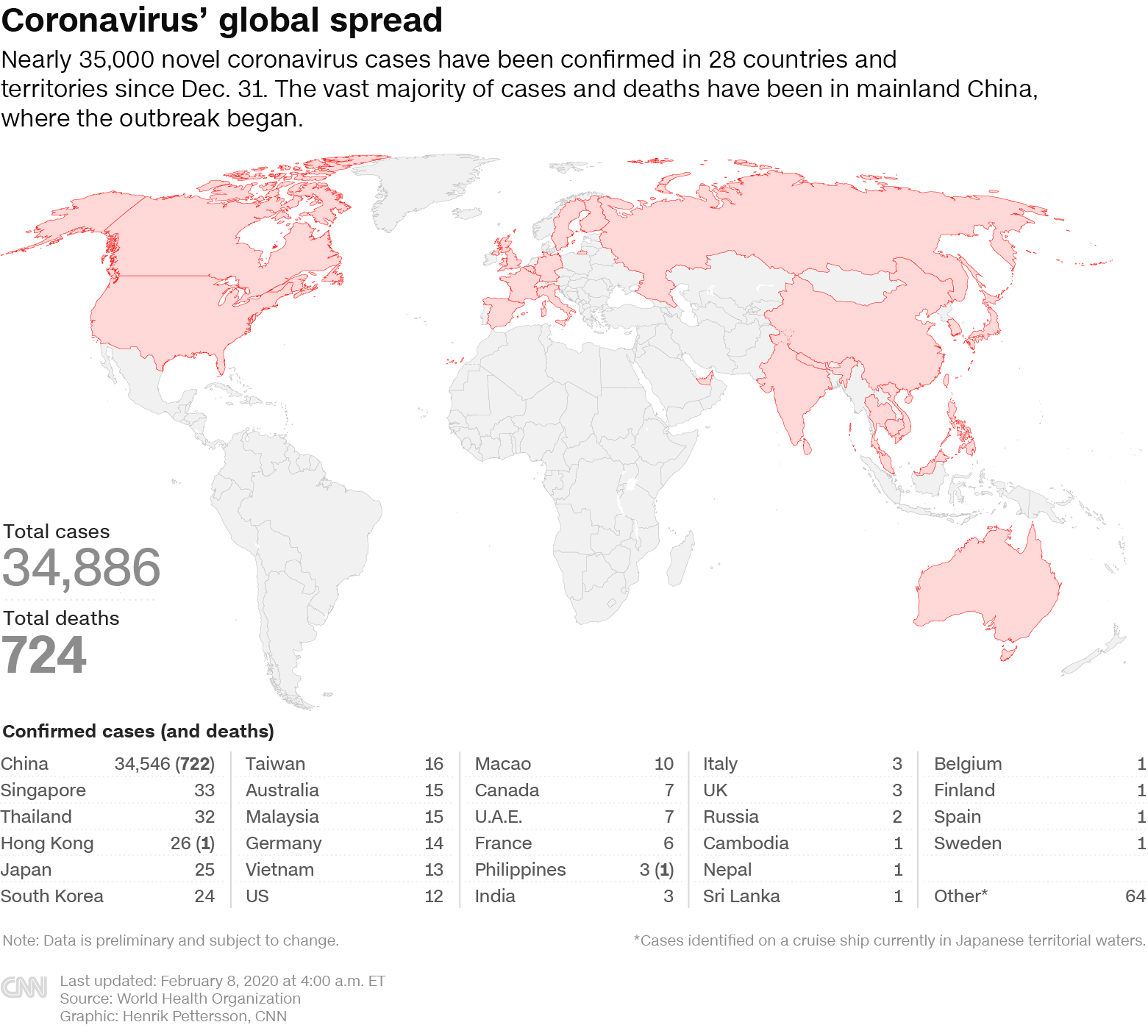CNN's live coverage of the coronavirus has moved here.
February 8 coronavirus news
By Angela Dewan, Joshua Berlinger and Jenni Marsh, CNN
The Wuhan coronavirus has killed more people than the 2003 SARS outbreak
The global death toll from the Wuhan coronavirus is at least 805, surpassing the number of fatalities from the deadly 2003 SARS outbreak.
When severe acute respiratory syndrome (SARS) swept through the region, it infected more than 8,000 people and killed 774.
Like SARS, this latest outbreak is caused by a coronavirus, a family of viruses common to animals that range from the common cold, to more serious diseases, such as Middle East respiratory syndrome (MERS).
Both the SARS and Wuhan outbreaks started in China -- and both are believed to have originated from wild animal markets.
Hubei provincial death toll rises to 780
From CNN’s Steven Jiang in Beijing
The coronavirus death toll in the Chinese province of Hubei has risen to 780, according to the local health authority. That's an increase of 81 people from the day before.
The total number of confirmed cases in Hubei jumped to 27,000.
There are more than 20,000 patients hospitalized in Hubei province and 1,154 are in critical condition.
Manchester United's Odion Ighalo is skipping training camp due to coronavirus travel restrictions
From CNN's Nicole Chavez

Manchester United's newest signee Odion Ighalo will not join his teammates for training camp in Spain because travel restrictions linked to the coronavirus may prevent him from returning to England, the team's manager said.
The 30-year-old joined the Premier League club in a deadline day loan from Shanghai Shenhua and arrived in Manchester from China only in the past 14 days.
”Because of the situation in China, we're not sure if he'd be allowed back into England if he leaves the country again, so he's staying here working with a personal coach, individual programme and his family then can settle in England as well. That's a plus," United manager Ole Gunnar Solskjaer told the team's in-house TV station.
They were ready to adopt a girl from China. The coronavirus outbreak put a stop to their plans
From CNN's Natasha Chen
An American couple was planning to finally pick up their adopted daughter in China this weekend. Now, the process is on hold due to novel coronavirus.
After two years of paperwork, Ivy and Noah Cleveland had a room, a crib and clothes ready to welcome 3-year-old Ruby into their Georgia home. But their adoption agency canceled the trip that would have finalized Ruby’s adoption.
“This was the first time in my life that I truly wept to the point of being sick in my body,” Ivy Cleveland told CNN. "I just laid over her bed, over her crib that I had prepared for her and look up at the pictures in the wall, and her clothes in her closet, understanding that this is not happening right now.”
Last month, the State Department issued the highest-level warning not to travel to China due to the coronavirus outbreak and recommended that US citizens defer travel for adoption purposes.
“We strongly recommend that U.S. citizens defer travel to China for adoption purposes and that prospective adoptive parents contact their adoption service providers to discuss future plans,” the department said on January 31.
The Clevelands are unsure when they will able travel to China, but said they are not ready to give up their adoption process.
“I know this is just a part of our story, it’s part of Ruby’s story and how incredible will it be to tell her ‘look what we did to fight for you,’” Noah Cleveland said.
More than 200 Canadians were evacuated from Wuhan this week
From CNN's Elizabeth Joseph
About 213 people, including Canadian citizens and their families, who were evacuated from Wuhan have returned to Canada, officials said.
“I want to thank everyone who helped bring these Canadians home safely. They have undoubtedly undergone a stressful situation and we are thankful that they are back in Canada," Health Minister Patty Hajdu said in a statement.
The group traveled in a Canadian chartered plane and a second flight led by the United States.
The evacuees were placed in a 14-day quarantine at the Canadian Forces Base Trenton in Ontario. None of them have shown symptoms of novel coronavirus, authorities said.
World Health Organization to send a team to investigate the coronavirus outbreak in China
From CNN’s Arnaud Siad in London
The World Health Organization will send an international team to investigate the coronavirus outbreak to China, with the team leader leaving for China on Monday or Tuesday, WHO Director-General Tedros Adhanom Ghebreyesus said at a press conference in Geneva on Saturday.
Ghebreyesus said the rest of the experts on the team will follow “after that.”
When asked whether the international team will include officials from the US Centers for Disease Control and Prevention (CDC), Ghebreyesus said, “We hope so.”
New study explores how the coronavirus is spreading and how little we know about it
From Dr. Tom Frieden
A study published Friday in the Journal of the American Medical Association (JAMA) found that 41% of the first 138 patients diagnosed at one hospital in Wuhan, China, were presumed to be infected in that hospital.
This is big news. In plain English, it means that nearly half of the initial infections in this hospital appear to have been spread within the hospital itself. This is called nosocomial transmission. (Doctors use big words to hide bad things: Nosocomial means caught it in the hospital.)
What's more, most spread doesn't appear to have been the result of a so-called "super-spreader event," in which a single patient transmits infection to many other people. In these — where a doctor inserts a tube into the patient's lungs — can result in many infections.
This would be a concern, but not nearly as much as what appears to have happened: Many health care workers and many patients got infected in many parts of the hospital. What's more, since there's a broad spectrum of infection and only patients who were sick were tested, it's quite likely that there was even more transmission in the hospital.
So, like SARS and MERS — other coronaviruses — before it, the Wuhan coronavirus is spreading in hospitals.
What does this mean? The virus appears to be quite infectious, health care workers are at especially high risk, and we urgently need more information about just how infectious the virus is. The virus might well be impossible to contain — just as the common cold and influenza can't be stopped, but the health and societal impacts can be blunted.
China's extraordinary efforts to stop the spread of the virus, even if unsuccessful, may slow its spread and improve China and the world's ability to limit the harm the virus causes.
Dr. Tom Frieden is the former director of the US Centers for Disease Control and Prevention, and former commissioner of the New York City Health Department. He is currently president and CEO of Resolve to Save Lives, a global non-profit initiative funded by Bloomberg Philanthropies, the Chan Zuckerberg Initiative, and the Bill and Melinda Gates Foundation and part of the global non-profit Vital Strategies.
Global spread: Nearly 35,000 cases of coronavirus confirmed worldwide
World Health Organization figures show that the virus has affected at least 28 countries, many of them in Asia, and has reached as far as the US and Australia.
The vast majority of the cases and deaths are in mainland China.




